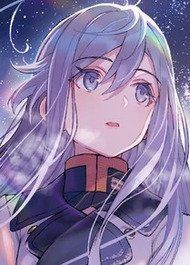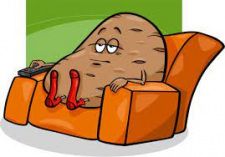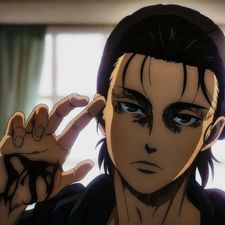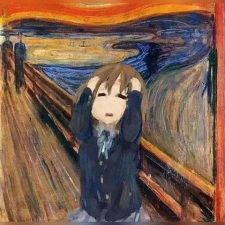
Vinland Saga is the embodiment of anachronism and the self-fulfilment of the mocked utterance "If you kill your enemies, they win." Imagine yourself being sold into slavery in 11th-century Scandinavia after brute-forcing your way to the Viking conquest of England’s conclusion as a mercenary. At this point you’re well acquainted with the brutish nature of the Dark Ages and the horrors of mankind--ceaseless wars and raids, slavery, the razing of entire villages, violent wars of succession--and in particular the ruthless 'might makes right' warrior culture of the Vikings which one of your loved ones died at the hands of. Now imagine one day in that traumaticlife of yours you start preaching 21st-century first-world pacifist ideals as a hollowed-out, depressed slave because of a dream. Then give yourself a pat on the back if you think this is an inherently juvenile and asinine concept that first off could never see ideation in such a context, would never see the light of day even if you could conceptualize it, and would never work even if it did see the light of day; because unlike Vinland Saga, you have at least an iota of a grasp on reality. Vinland Saga Season 2 is not only ugly on the outside as an audiovisual experience but also on the inside as a grossly delusional historical fiction that insists upon itself with pretentious moral righteousness, wanting to have its cake and eat it with its faux philosophising whilst attempting to work within the confines of reality. It is a shounen in seinen’s clothing. What started out as a half-decent historical fiction that read almost like a gritty epic, with clear direction and dynamic characters to match, degenerates into aimless, feeble meandering with sluggish pacing and lethargic characters that reads more like a rant from the author than an actual story in its whiplash of a shift into a slice-of-life. The seeds of failure, however, were already sown from the very beginning of the series when Thorfinn's father spoke the essence of his philosophy on his deathbed "A true warrior has no need for a sword"--like a true 17th century Bushido-ideal samurai based in 11th century Scandinavia who uses "no sword" in the literal sense of the words as opposed to metaphorically. Whilst admirable that he cast aside his penchant for violence and surrendered a prestigious life of fierce warrior-ship in order to settle down with his wife and children and ensure them a peaceful life, the story would immortalise him as an aspirational wise man for orphaning a son and widowing a wife into misery because he surrendered to a death he could've easily avoided by sacrificing his family and himself for his moral code of pacifism. What if Askeladd--who’d already shown not to be trusted--didn’t uphold his promise, or if Bjorn massacred the Icelandic village anyway? Vinland Saga expects you to take Thor’s unconvincing dichotomy in faith as it begins using this fundamentally flawed premise as the foundation of the Slave arc and Thorfinn’s character piece, and the self-defeating polarity of venerating an ideology that just lead to a family’s demise is foreshadowing for the story's downwards spiral from this season onwards. Thorfinn, seeing how well pacifism turned out for his father and reaping its fruits first-hand, suddenly becomes one himself this season. Whilst anachronism is Vinland Saga’s biggest problem--how it’s flawed on a fundamental level because its thematic execution conflicts with its own established world due to the author projecting his modern-day moral standards onto a story about 11th century Vikings--its inoperative veer into a medieval farming simulator means the themes it wants to convey here aren’t even made palatable on an external, structural level. The Slave arc lacks a defined act structure and feels like a tedious detour from the prologue, with no narrative drive and momentum. There are long stretches of uneventful moments mostly accompanied by Thorfinn and Einar babbling in a struggle to come to grasp the basic concept of ‘self-preservation’ as the directing in all its unsophisticated artistry (or lack thereof) displays severed heads in order to depict the mental state of a man. All the philosophical ramblings with obvious implications mean pacing thrice as slow as the previous arc isn’t compelling when it fails to be the psychological character-driven introspective it pretends to be. What other stories resolve in 3 episodes, Vinland Saga takes 24 to do without a convincing conclusion. There is no reason for over a dozen episodes to be dedicated to the (bizarrely portrayed) mundane slice-of-life of slaves on a farm, it’s the most astroturfed way imaginable to advance Thorfinn’s already deficient pacifist epiphany; especially when such an overarching theme is something as basic as “Slavery is… bad!” You are taught this in elementary school. This could have been done in less than 3 episodes under the dynamism of the prologue, and Thorfinn’s pacifism would have at least been somewhat more believable in a plot with proper happenings gravitating him towards an active MC role instead of being a glorified exposition dump in disguise for what he’s thinking. The series’ soft reset completely bottlenecks the natural progression of the once hot-blooded plot and characters that the series laid out, and thus Farmland Saga struggles to justify its existence. It no longer moves forward in sharp incremental episodes but wallows in nigh-episodic bloat. The character who suffers the most from this stifling shift in direction is of course Thorfinn, who’s treated like a messianic figure for some reason that the narrative never challenges the ideals of. You can now break down his character arc as Sasuke Uchiha —> Jesus Christ. Honestly, Canute's way of peace is far more pragmatic and he should've been the main character after Askeladd's death. The plot is also cultivated primarily by poor character drama, unintelligent character decisions, accidental happenings and plot devices, which is why aside from most of the cast being lifeless husks, are also unlikeable. Einar is only angry about no longer being a free man and seeing his family members murdered before his eyes in the immediate moment, and he and the 10 unrestrained slaves being transported by boat by the few Danish raiders never attempt to resist or hijack the vessel. Gardar is introduced to serve merely as a tool for the series to once again unsubtlely preach “Here’s why violence is bad” in a scene that diminishes both his and Arnheid’s character after the two had already received incessant flashbacks that could’ve instead made way for more pivotal moments in the story like a certain reunion not being underwhelming. Even the climax of this arc is an illustration of shallow thematic execution; a culmination of the poor character drama and unintelligent character actions, where Thorfinn displays suicidal levels of restraint that should’ve gotten himself killed if not for the plot armour that the narrative places on his idealism, followed by corny dialogue and an unbelievable resolution that assassinates Canute’s character writing. "I have no enemies." Bravo Uzumaki Thorfinn.

















